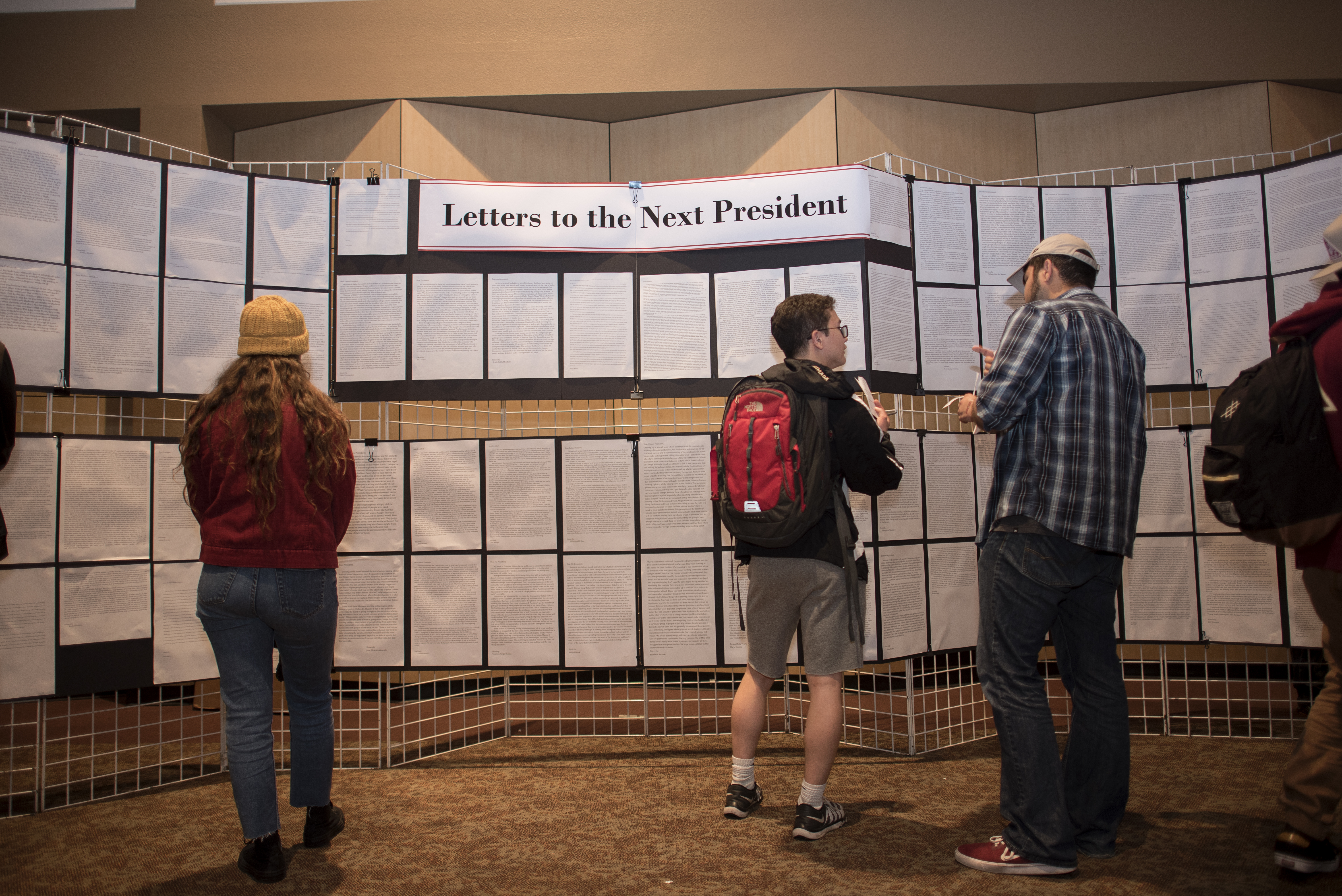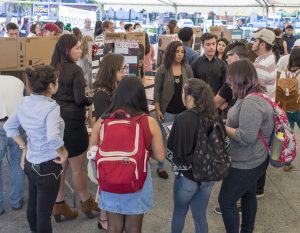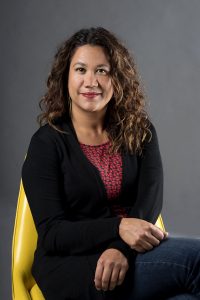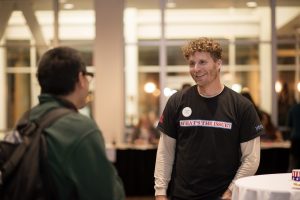First-Year Experience Stirs Young Voter Engagement

Students look at and discuss Letters to the Next President, a project by First-Year Experience, at Wildcats Vote last month (Jessica Bartlett/Chico State student photographer)
Early last spring, California State University, Chico English Professor Thia Wolf polled her First-Year Experience student staff members to see how informed they were about current regional, national, and international affairs, asking them how much they track current events, and if they intended to vote in the fall.
“When they didn’t have much to say, I told them that as a civic engagement program we had to do better,” recalled Wolf, who is also director of the First-Year Experience (FYE) program, which assists new students’ transition to college life. “We brainstormed ways of helping them become informed as future voters.”
One of their ideas involved sharing their work more broadly around campus. The program came up with a weekly tabling hosted by FYE students that offered students the opportunity to discuss—in a non-partisan manner—why they have chosen to vote, as well as talk about election issues, ballot propositions, and platforms of the candidates who are shaping the 2016 elections.
This weekly tabling, called What’s the Issue?, has been deemed a success.
“Working on What’s the Issue? has allowed the students to think creatively and have fun, and they’ve also gained a lot of knowledge in terms of what it means to be politically engaged,” said Gina Tigri, program coordinator at FYE. “They’ve learned a lot about the political process and the upcoming election, and they’ve also done a lot of work to understand how we can mobilize the millennial vote. They’re not just talking the talk, they’re walking the walk.”
Say what you will about the circus around the 2016 general election, there’s a possible silver lining: here at Chico State, all the attention has flipped the on-switch for young voters, with that generation on campus now clearly getting involved.
Traditionally, the number of eligible youth aged 18-24 that vote in elections is low. According to a report by the California Secretary of State, just 52 percent of eligible youth in California registered to vote in the 2014 general election, more than 20 points lower than any other age group. Overall, a paltry 8 percent of eligible youth voted in 2014.

What’s the Issue? gained steam in the fall semester, tabling every Wednesday at various locations around campus—and that was just the beginning of FYE’s efforts to fire up students and young voters. Last month, the group co-hosted Chico Great Debate, during which students took part in friendly debates, conversations, and information booths at the Chico City Plaza and the old and new Municipal Halls, as well as the Chico City Council Chambers.
FYE held a day-long event on Oct. 24, the deadline for voter registration.
First, What’s the Issue? went big and took over Selvester’s Café, with dozens of groups present. Later that evening, FYE moved indoors with Wildcats Vote!, an effort to get as many eligible young voters registered as possible before the deadline.
On Thursday, FYE produced the 10th annual CSU, Chico Town Hall for the Department of Political Science. Later this month, they’ll produce a sustainability-focused event called the Sense of Place Symposium, and will host the Social Justice Fair in December.
“We work hard to make sure that every first-year student’s voice is heard in a public arena in at least one course,” Wolf said. “Our data, both quantitative and qualitative, strongly suggest that students have an improved view of themselves and of their choice to go to college following these public experiences.”
Dawn Frank is the interim FYE coordinator for the Educational Opportunity Program, and her hope leading into

election season was that her incoming freshmen would develop stronger voter identities. The process began in the spring, took root over the summer, and strengthened this semester.
“These students continue to inspire and motivate me to have intentional conversations with them and others around political issues of importance to their lives,” Frank said. “For our first-generation, low-income students, the personal is political, and this election is hitting home for many of them. For What’s the Issue?, they chose topics ranging from immigration and student debt to homelessness and police brutality.”
FYE student Richard Mata focused on police brutality, as he and his team set up their booth at the Oct. 24 What’s the Issue? event.
“This topic hit home because a lot of us in our group are in the minority community. We come from inner-city communities, so what you see on social media, we’ve seen a lot of it first-hand,” Mata said. “We were able to connect with it on a whole new level.”
This connection serves as the spark for the majority of FYE students, and events like What’s the Issue? are the conduit for more critical thinking and conversation, as well as for increased engagement in young voters.

Nate Millard, mentor supervisor for FYE, says the FYE staff that work at events with students believe in them, thanks in large part to the way Wolf empowers students.
“We know that students won’t stay with us long, so the staff are always training up newcomers to take over their role. That mentoring within the organization is really successful,” said Millard.
When sociologist and noted higher education theorist Vincent Tito wrote about the importance of rites of passage for college students, he lamented that graduation is oftentimes the only one, taking years to reach.
Wolf is working to flip that script.
“I see voting as a rite of passage that emerging adults can participate in as they work to achieve full adult status,” she said. “FYE has consciously looked for and tried to build ways to include these rites in the lives of as many first-year students as possible.”


